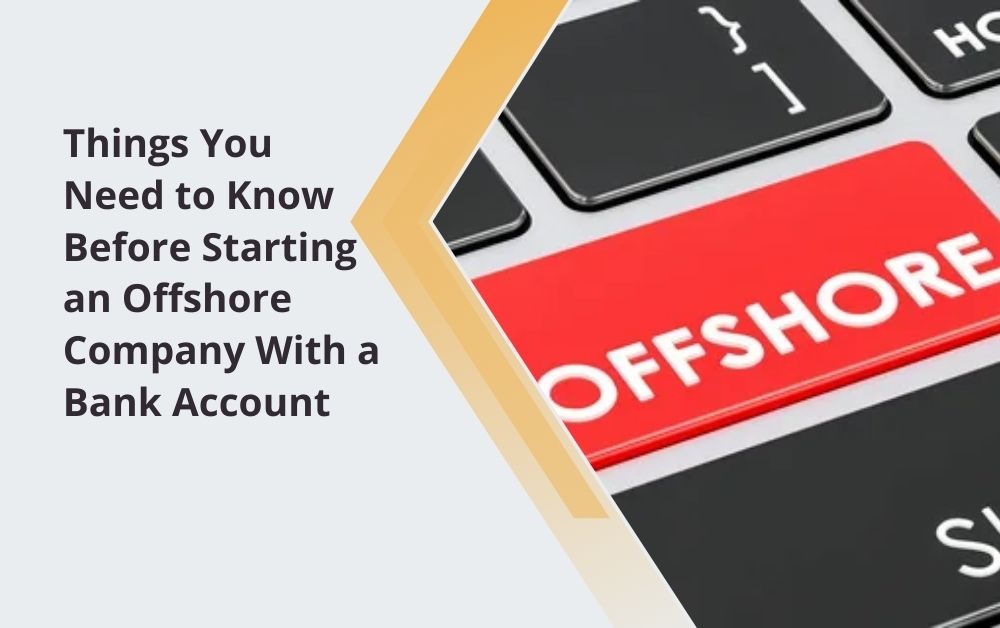Starting an offshore company can be a smart move for various reasons, including tax benefits, privacy, and international business opportunities. However, before diving into this process, there are important things you need to understand. This guide will walk you through everything you need to know before starting an offshore company and setting up a bank account for it.
What Is an Offshore Company?
Understanding Offshore Companies
An offshore company is a business entity that is registered in a country different from where it operates or where its owners reside. The primary reasons people choose offshore companies include:
- Tax Benefits: Many offshore jurisdictions offer lower taxes or tax incentives.
- Privacy: Offshore companies can offer greater privacy for owners and shareholders.
- International Business: They can facilitate international trade and investment.
Common Uses of Offshore Companies
- Tax Planning: Reducing overall tax liability.
- Asset Protection: Safeguarding assets from legal claims or political instability.
- Investment Opportunities: Accessing global markets and investment options.
NOTE:- If you’re considering starting an offshore company with a bank account, don’t navigate this complex process alone. Contact us today for expert advice and professional support to ensure a smooth setup. Get in touch now to discover how we can help you achieve your international business goals with confidence!
Key Considerations Before Starting an Offshore Company
Choosing the Right Jurisdiction
The first step is to choose a jurisdiction for your offshore company. Different countries offer various benefits, so consider:
- Tax Regulations: Look for jurisdictions with favorable tax rates.
- Privacy Laws: Choose a country that offers strong privacy protections.
- Ease of Business Setup: Some countries have more streamlined processes.
Legal and Regulatory Requirements
Each jurisdiction has its own legal and regulatory requirements. Make sure you understand:
- Company Formation Rules: Learn about the necessary documents and procedures.
- Compliance Obligations: Be aware of any ongoing compliance requirements, such as annual reports or audits.
Costs Involved
Starting an offshore company comes with various costs, including:
- Formation Fees: Initial costs for setting up the company.
- Annual Fees: Regular fees to maintain the company.
- Legal and Consulting Fees: Costs for legal advice and consultancy services.
Setting Up a Bank Account for Your Offshore Company
Choosing the Right Bank
Selecting the right bank for your offshore company is crucial. Consider:
- Bank Reputation: Look for a reputable bank with a strong track record.
- Banking Services: Ensure the bank offers the services you need, such as international transfers and multi-currency accounts.
- Fees and Charges: Compare fees for account maintenance and transactions.
Documentation and Requirements
Opening a bank account for your offshore company requires specific documentation, including:
- Company Registration Documents: Proof of your company’s registration and legal status.
- Identification Documents: Personal identification for directors and shareholders.
- Proof of Address: Evidence of the company’s and individuals’ addresses.
Bank Account Types
There are several types of bank accounts you can choose from:
- Business Checking Accounts: Ideal for everyday transactions.
- Savings Accounts: Useful for holding funds with interest.
- Multi-Currency Accounts: Good for handling multiple currencies in international business.
Legal and Compliance Issues
Understanding Tax Implications
Even though your company is offshore, you may still have tax obligations in your home country. Be aware of:
- Reporting Requirements: Some jurisdictions require you to report offshore income.
- Double Taxation Treaties: Check if your home country has treaties with the offshore jurisdiction to avoid double taxation.
Anti-Money Laundering (AML) Regulations
Banks and jurisdictions have strict AML regulations. Ensure you:
- Follow AML Guidelines: Comply with all AML requirements to avoid legal issues.
- Maintain Proper Records: Keep accurate records of all transactions and company activities.
Benefits and Risks of Offshore Companies
Benefits
- Tax Efficiency: Potentially lower tax rates and better tax planning.
- Confidentiality: Increased privacy for company owners and transactions.
- Global Business Opportunities: Easier access to international markets.
Risks
- Regulatory Challenges: Complex and varying regulations across different jurisdictions.
- Reputation Issues: Offshore companies can sometimes face negative perceptions.
- Legal Compliance: Ensuring compliance with both local and international laws.
How to Get Started
Finding a Professional Service Provider
To navigate the complexities of setting up an offshore company and bank account, consider hiring:
- Legal Advisors: For guidance on legal matters and compliance.
- Consultants: For help with choosing the right jurisdiction and bank.
- Accountants: To manage financial and tax matters.
Research and Planning
Before making any decisions, thoroughly research and plan:
- Compare Jurisdictions: Evaluate different offshore jurisdictions based on your needs.
- Review Banking Options: Look at various banks and their offerings.
- Understand Legal Requirements: Be clear on the legal requirements and compliance issues.
Make an Informed Decision
Starting an offshore company with a bank account can offer significant advantages, but it requires careful planning and understanding. Ensure you are well-informed and seek professional advice to make the best decisions for your business.
Conclusion
Starting an offshore company with a bank account involves many considerations, from choosing the right jurisdiction to understanding legal and compliance issues. By following the guidelines in this article and seeking professional advice, you can set up your offshore company successfully and enjoy the benefits it offers.
For more insightful articles related to this topic, feel free to visit thataiblog.com




